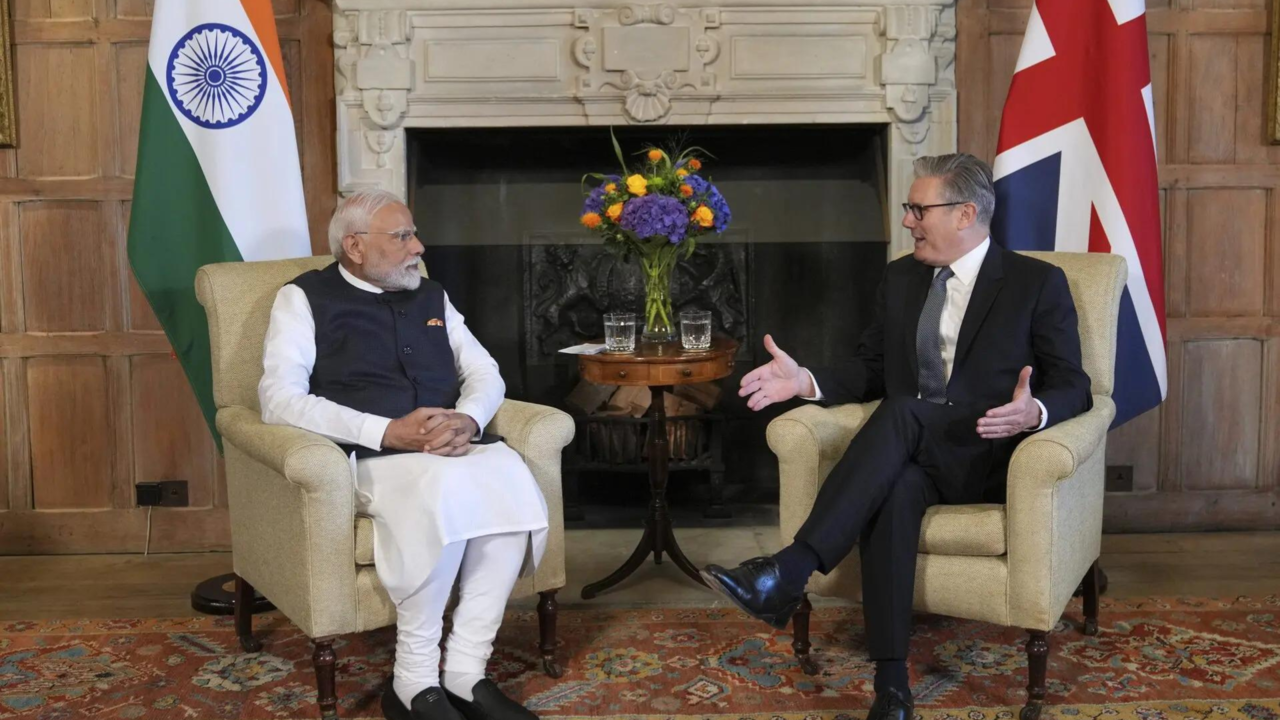
Prime Minister Narendra Modi with his British counterpart Keir Starmer
Photo : AP
India and the United Kingdom (UK) on Thursday signed a historic trade deal that will boost the bilateral trade between the two countries by around $34 billion annually. The “biggest” deal post Brexit was signed by India’s Commerce Minister Piyush Goyal and British Trade Minister Jonathan Reynolds in the presence of Prime Minister Narendra Modi and his British counterpart Keir Starmer.
The historic Free Trade Agreement (FTA) will slash tariffs, open up markets, and strengthen bilateral economic ties between India and the UK. The deal is being hailed as the largest and most comprehensive post-Brexit trade pact for the UK, and India’s most significant FTA to date.
What India Gets: Zero Duties and Market Access
Zero tariffs on 99% of Indian exports to the UK, covering key sectors like:
- Textiles
- Generic pharmaceuticals
- Medical devices
- Leather goods
- Chemicals
- Agricultural products
Major Boost for Key Indian Export Sectors
The trade pact is expected to significantly benefit India’s core export industries. Indian agricultural products will receive tariff parity with major EU exporters like Germany, levelling the playing field in the UK market. The textile and leather sectors are also set to gain, with India’s leather industry projected to capture an additional 5% of the UK market within two years. Electronics and engineering exports are expected to double by 2030, while chemical exports could see a 30–40% surge in the next fiscal year. The gems and jewellery sector is projected to double its exports to the UK, from the current $941 million, within three years. Meanwhile, software services exports are estimated to grow by 20% annually under the new trade framework.
What the UK Gains: Big Tariff Cuts and Investment Opportunities
UK whisky and automotive exports to India will become cheaper and more competitive:
- Scotch whisky tariff will be cut from 150% to 75% immediately, and further reduced to 40% over 10 years.
- Electric vehicle (EV) tariffs will drop from 110% to 10%, with a quota-based system in place.
- India will reduce 90% of its tariff lines, with the average duty on UK goods dropping from 15% to 3%.
- British companies will gain access to Indian government procurement contracts.
- Financial services firms from the UK will receive equal treatment with Indian firms, under a dedicated financial services chapter.
Intellectual Property and Generic Drugs
The agreement includes a chapter on intellectual property, but Indian officials confirmed that it does not compromise India’s ability to produce and export generic drugs, addressing key concerns around healthcare access.
Investment & Job Creation
UK Prime Minister Keir Starmer announced £6 billion in new investments and export deals, which are expected to:
- Create 2,200+ new jobs across the UK.
- Encourage Indian companies to expand operations in Britain.
What’s Next?
The deal will now be sent for cabinet approval in India and ratification by the UK Parliament. A separate bilateral investment treaty (BIT) between the two countries is still under negotiation.
Projected Impact
UK government estimates suggest the deal will:
- Boost UK exports to India by nearly 60% over the long term.
- Drive down prices for UK consumers.
- Create thousands of jobs and expand market access for businesses in both nations.
This landmark India-UK Free Trade Agreement marks a pivotal shift in global trade alignments, reflecting both nations’ strategic economic priorities. It not only enhances market access and reduces trade barriers but also sets the stage for deeper cooperation in technology, services, and investment. As the deal awaits final ratification, it is poised to deliver long-term economic dividends, generate employment, and redefine bilateral ties in a post-Brexit, post-pandemic world.